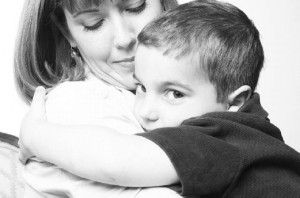By Carrie Kerr, Safe Sleep Editor for The Attached Family
My grandma was working on writing a book when I was a teenager. The subject was music. She never finished the manuscript, so I can’t be sure of the exact focus of her topic, but I do remember that she interviewed my brother and me on the theory behind Alternative Rock. I didn’t have all that much to offer; I just listened to what sounded good. But my brother, always the academic type, was quick to add his input. He said, “These bands have stripped away the unnecessary layers and gone back to the basics. They threw away the synthesizers, and all the extra bells and whistles, and have focused on the classic instruments of guitar, drums, and voice.” I don’t know if his explanation was accurate or not, but I was reminded of his comments recently as I came across a parenting message board from a fairly prestigious college in California, USA.
I had never visited the site before, and I was very interested to see how such an intellectual group of people addressed the parenting topic of sleep. The advice was fair. It was supportive, friendly, educated, and it was very much Attachment Parenting (AP). But as I read on, I became overwhelmed by the amount of input on the subject. I couldn’t help but think to myself, “All of this advice is over-the-top. What ever happened to intuition?”
Shortly thereafter, I started reading a book by Dr. Gordon Neufeld and Dr. Gabor Mate entitled Hold On to Your Kids. Interestingly enough, my thought process was affirmed early on in the “Note to the Reader.” It said, “The modern obsession with parenting as a set of skills to be followed along lines recommended by experts is, really, the result of lost intuitions and a lost relationship with children previous generations could take for granted.” Now, that being said, it is also human nature to discuss day-to-day joys and struggles with our friends, relatives, or experts. But, in considering how to best get our children to sleep, I’d like to bring intuition back into focus.
Intuition refers to the ability to understand something immediately, without the need for conscious reasoning. We all have intuition, but often our gifts for it are in differing domains. For instance, some people may have great intuition when it comes to safety or emergencies, whereas other people lack common sense or tend to panic. This can be seen in parenting as well. I have heard people say, “I’m not very maternal.” They probably mean that they don’t have a strong intuition for handling children. Strongly knit societies typically have had frameworks for helping develop this intuition in the younger generations. Modern-day societies are struggling with this. As a result, the door for random parenting advice is wide open.
AP is largely based on the idea that we do have instinctual parenting skills and, with the right support, we can reconnect with the behaviors of our ancestors. Our current culture has made that difficult. We don’t have, as Neufeld explains it, “attached cultures” in our society. Our communities are segregated by age groups, with large gaps often existing between the young and the old. Instead of gleaning the wisdom and experience of our elders, we look to our peers for advice. This habit carries the risk of becoming a circular, fruitless, and maybe even harmful experiment.
What if the way you parented your child at night was only between you and your child? What if you never had to tell the opinionated bystander if your baby did or did not sleep through the night; you never had to hear unsolicited advice from your best friend; you only had to do what felt right to you and your child? What if you threw away the message boards, threw away the parenting books, and didn’t have any baby gadgets? Then what would you do when you and your baby were tired?
When it comes down to it, the issue of sleep is largely based on individual child/parent needs. We need to be less concerned with following a superficial protocol and more concerned with thinking critically about our unique situations. Game plan or not, intuition will be the leader for meeting the spontaneous needs of your child. A parent always needs to be sensitive to the miraculous instincts that come with parenting — the unexplained start that wakes you up only to realize your child has a fever, or the let-down of milk just moments before your baby starts crying. To override that with advice that is outlined by current trends, even those we view as positive, can be counterproductive.
Sometimes, like too many synthesizers in a band, all of the nighttime parenting advice gets in the way of our inner voices. For just a moment, I suggest we stop layering ourselves with tips and strategies, stop reading, stop second-guessing. Perhaps all of the overanalyzing is what’s actually exhausting! Regardless of my advice to you, or someone else’s advice to me, it often comes down to personally testing the waters of our unique situations. It’s about listening to your child, his or her needs, and the reasonable, responsive inner voice that comes with the age-old occupation of parenting.

 Q: I get a lot of advice that babies and children do better if they have a routine way of doing everything, especially sleep time. Personally, it is very challenging for me to enforce a sleep time on my baby. How important is it to have schedules and routines for sleep, food, or other activities?
Q: I get a lot of advice that babies and children do better if they have a routine way of doing everything, especially sleep time. Personally, it is very challenging for me to enforce a sleep time on my baby. How important is it to have schedules and routines for sleep, food, or other activities? All babies cry. And all parents are continually striving to find the best way to respond to those cries.
All babies cry. And all parents are continually striving to find the best way to respond to those cries.